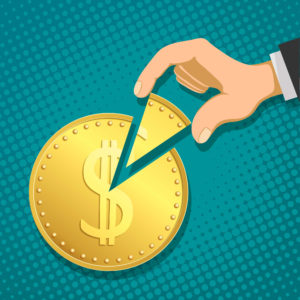By Mark Seed, myownadvisor
Special to the Financial Independence Hub
What makes a great Exchange Traded Fund (ETF)?
What makes a great Canadian dividend Exchange Traded Fund?
What are the top Canadian dividend ETFs to own?
You’ve come to the right site and the right post.
Top Canadian Dividend ETFs – what is an ETF?
An ETF (Exchange Traded Fund) is a diverse collection of assets (like a mutual fund) that trades on an exchange (like a stock does).
This makes an ETF a marketable security. It has trading capability. Since you and buy and sell ETFs on an exchange during the day, prices can change throughout the day as they are bought and sold.
ETFs typically have lower fees than mutual funds (although not always), which can make them an attractive alternative to mutual funds.
Based on my personal experiences approaching 20 years as a serious DIY investor, ETFs are easy to buy using a discount brokerage and offer a low-cost way to own dozens if not hundreds of stocks to diversify your portfolio.
Although you don’t need to buy equity ETFs, it is my belief that you’re FAR better off owning more equities than bonds over long investing periods.
The reason for this is rather simple: if you want predictable returns you’re going to have to live with lower, long-term returns that offer this predictability. If you want higher, long-term returns, you’re going to have to live with the short-term volatility that comes with higher-risk equities.
Simply put: learn to live with stocks for wealh-building.
If you’re just starting out your investing journey, you can learn more about ETFs here.
What goes into a good ETF? What should you consider?
Before we get into my favourite Canadian dividend ETFs, here are some elements that make up a solid ETF:
1. Style – ETFs can track an index, follow an industry sector, be rules-based like some smart-beta funds are, or be much more. For the most part, I prefer either plain-vanilla, broad market equity indexed ETFs or dividend ETFs when I share my favourites with readers or other investors. This is because the former provides market-like returns less skimpy money management fees. Dividend ETFs can provide income; tangible money you and I can use as we please while offering some long-term growth. I avoid other types/styles of ETFs based on futures, hedges or swap agreements. By and large those products tend to make the company offering those funds rich, not you.
2. Fees – Hopefully by now you know high money management fees kill portfolio values over time. When it comes to fund fees in particular, my bias is, I try to keep the management expense ratio (MER) (the fee paid to the fund’s manager, as well as taxes and other costs) low for as long as possible. That means I wouldn’t consider owning any ETF over an MER of about 0.50% – including any Canadian dividend ETF. You should also be considering investing in products with fees that are lower than that.
Further Reading: Learn about MERs, TERs and more about ETF fees here.
3. Tracking error – In short, tracking error is the difference between the performance of the fund (the ETF) and its benchmark (what it tracks). I would advise you to look at the fund’s prospectus before you buy it and strive to own ETFs with low tracking errors.
4. Diversification – Along the same lines ‘Style,’ you should be very mindful of the assets within an ETF before you buy it. ETFs are not created equal.
For a quick example, I’ve been a huge fan of Canadian broad market ETFs like XIU, XIC, ZCN, VCN, along with others over the years.
I like XIU in particular.
XIU holds the largest 60 stocks in Canada. XIU however has nowhere near the number of holdings that VCN has (214 at the time of this post) yet XIU has delivered stellar long-term returns better than most. Just because of the limited fund holdings, is XIU really an inferior product to VCN for our Canadian market? Hardly.
Based on my personal experiences, diversification can be a great ally as a risk mitigation tactic against stock picking but that doesn’t mean it’s bulletproof. Indexed ETFs hold all the studs and duds in fact. Typically the larger the ETF equity holdings are, the better the chance you’ll own all the stock duds and studs as well. More stock holdings does not automatically equate to better returns.
5. Tax efficiency – If you never intend to max out your TFSAs, RRSPs, kids’ RESPs, or other registered accounts then this is a non-issue for you.
For some investors however, who invest outside registered accounts (such as the aforementioned RRSPs, RRIFs, TFSAs, RESPs, LIRAs) like I do, then you need to consider the tax efficiency of your ETFs.
Be wary of ETFs that have lots of turnover by the fund manager (through buying and selling securities) – those funds are likely to result in more costs to you.
In taxable accounts, I would advise you to look at the fund’s prospectus before you buy it and strive to own ETFs that are as tax efficient as possible.
Further Reading: How to invest for tax efficiency investing in taxable accounts.
6. History – While past performance is never indicative of future results unfortunately history is all we have since nobody can predict the financial future with any accuracy.
I think owning funds that have an established history of > 3 years or more is generally smart.
While new ETF entrants are fine, ETF tactics can change by the company that runs the fund at will – so buyer beware of any ETF niche products. This is yet another reason I believe sticking to plain vanilla funds or dividend ETFs that are easy to understand; something you can explain to a 10-year-old. Simplicity when it comes to investing is usually more value to you as the long-term investor.
What are my Top Canadian Dividend ETFs?
All data and information is current at the time of this post.
| ETF Symbol | MER | # of holdings | % Yield | 5-Year Return | 10-Year Return |
| VDY | 0.22% | 47 | ~ 3.5% | 10.84% | n/a |
| ZDV | 0.39% | 51 | ~ 4% | 8.35% | 7.31% |
| XEI | 0.22% | 75 | ~ 3.5% | 9.89% | 8.42% |
| XIU | 0.18% | 60 | ~ almost 3% | 9.67% | 9.16% |
Vanguard Canadian High Dividend Yield Index ETF (VDY)
One, the top-10 holdings dominate it, too many financials: you need to diversify away from top-6 banks. (I’ve actually chosen to own all these top-10 VDY stocks directly in my portfolio and more but your mileage may vary.) Two, the monthly distributions from this fund are a bit erratic. Otherwise, I believe this fund is top consideration for income and long-term growth.

Image from Vanguard VDY.
BMO Canadian Dividend ETF (ZDV)
I think for all-around performance, yield, cost and diversification, this Canadian dividend ETF remains top-notch. I also happen to own many of the ZDV holdings directly for income and growth. In fact, the ZDV portfolio is assembled using a screening process that includes the 3-year dividend growth rate.

Image from BMO ZDV.
iShares Core S&P/TSX Composite High Dividend Index ETF (XEI)
This is one of my favourite Canadian dividend ETFs because of the low management fee and modest number of holdings. I also like the number of consumer discretionary stocks and Real Estate Investment Trusts (REITs) that spice up this ETF among other fund assets.

Image from iShares XEI.
iShares S&P/TSX 60 Index ETF (XIU)
This remains one of my favourite Canadian dividend ETFs because it’s also considered one of the best “plain vanilla” equity ETFs in Canada. For a skimpy MER, you hold the largest 60 blue-chip companies in Canada. Year after year, I consider this ETF arguably one of the best products you could own for the Canadian content in your portfolio; steady yield/income of about 3% and long-term growth.

Image from iShares XIU.
Disclosure – I used to own XIU before I decided to unbundle this ETF for income and avoid paying money management fees to own dividend ETFs.
Top Canadian Dividend ETFs Summary
There are certainly many other Canadian dividend ETFs to consider, including ETF tickers such as PDC, CDZ, XDV; however, these ones float to the top of my list for all the reasons I think some ETFs are great for most investors to own anyhow:
1. Keep your fund fees low.
2. Consider funds that invest in many blue-chip Canadian companies across many sectors (so you can downplay fear of individual stock selection).
These funds will not only provide income for life but some modest capital appreciation over time.
What are your top Canadian dividend ETFs? Do you hold any and if so, which ones and why?
 Mark Seed is a passionate DIY investor who lives in Ottawa. He invests in Canadian and U.S. dividend paying stocks and low-cost Exchange Traded Funds on his quest to own a $1 million portfolio for an early retirement. You can follow Mark’s insights and perspectives on investing, and much more, by visiting My Own Advisor. This blog originally appeared on his site on May 24, 2022 and is republished on the Hub with his permission
Mark Seed is a passionate DIY investor who lives in Ottawa. He invests in Canadian and U.S. dividend paying stocks and low-cost Exchange Traded Funds on his quest to own a $1 million portfolio for an early retirement. You can follow Mark’s insights and perspectives on investing, and much more, by visiting My Own Advisor. This blog originally appeared on his site on May 24, 2022 and is republished on the Hub with his permission


